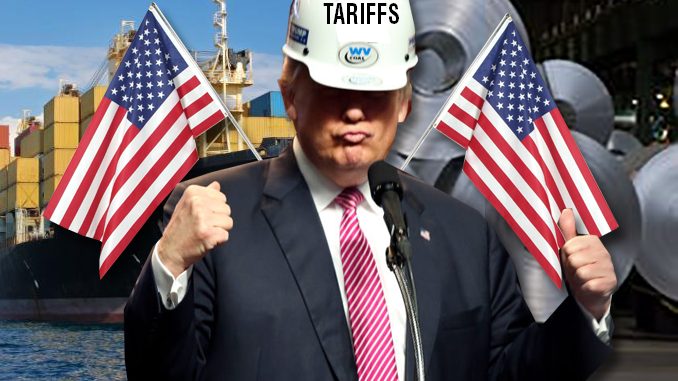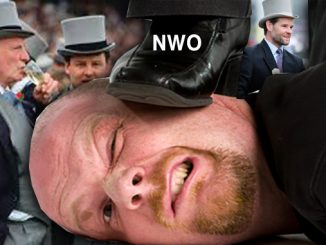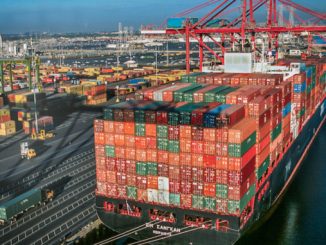
Despite doom & gloom scenarios offered by elite, bad trade practices needed to be killed.
By John Friend
President Donald Trump has long railed against what he describes as unfair trade deals and high tariffs imposed on U.S. businesses and manufacturers, denouncing many of the key pillars of the post-WWII global economic order and vowing to end these deals, which have harmed American workers and companies for decades now.
During the 2016 presidential campaign and following his election as president, Trump has repeatedly promised, much to the chagrin of leading globalists both in the U.S. and abroad, to impose tariffs on goods from other countries that impose high tariffs on U.S. goods and services as well as to enact other protectionist trade policies in an effort to boost American business and manufacturing.
Since the beginning of this year, Trump has imposed a number of tariffs on goods coming from long-time U.S. trade partners and allies, including Mexico, the European Union (EU), and Canada, particularly on steel and aluminum imports originating in these countries.
At the recently concluded G7 Summit, held in Quebec June 8-9, Trump described the high tariffs that target American manufacturers as “ridiculous and unacceptable,” and described the U.S. as “a piggy bank that everybody is robbing.”
On June 10, Trump let loose on Twitter, denouncing the free trade deals brokered by previous administrations.
“Why should I, as president of the United States, allow countries to continue to make massive trade surpluses, as they have for decades, while our farmers, workers & taxpayers have such a big and unfair price to pay? Not fair to the people of America!” Trump tweeted. “Sorry, we cannot let our friends or enemies take advantage of us on trade anymore. We must put the American worker first!” read yet another tweet, hinting at moves the president plans on making in order to rectify the unfair trade deals the U.S. has suffered under for so long.
Trump and his top advisers have argued recently that now is the time to take drastic action on these unfair trade deals, and they are expecting cooperation from traditional allies and longtime trading partners such as Canada, Mexico, and the EU.
“The global trading system needs major surgery and every country must be part of the solution, even our friends,” Daniel DiMicco, a former trade adviser to Trump’s campaign and current chairman of the Coalition for a Prosperous America trade group, explained to The New York Times recently.
Once again taking to Twitter to express his sentiments on the controversy, Trump explained simply: “The United States will not allow other countries to impose massive tariffs and trade barriers on its farmers, workers and companies while sending their products into our country tax-free. We have put up with trade abuse for many decades—and that is long enough.”
How much cooperation he will receive from other countries, including long-time allies and trading partners, remains to be seen. The president, however, appears more defiant than ever on this issue and has made it a central premise of his agenda.
Virtually the entire mainstream corporate media and political establishment have lambasted Trump and his criticisms of the various free trade deals that comprise the post-WWII global economic order, viewing free trade as sacrosanct and necessary for a prosperous economic powerhouse such as the United States. Sen. John Mc-Cain (R-Ariz.), a leading globalist and neoconservative warmonger, recently argued that “bipartisan majorities of Americans remain pro-free trade, pro-globalization, and supportive of alliances based on 70 years of shared values,” a false and unchallenged narrative that has been endlessly promoted and parroted by the political and media establishment for decades. And what have the results of this been? Millions of good jobs have left the United States, and the wealthiest 1% of the world have increased their net worth while hardworking middle-class Americans continue to struggle.
Trump and his top advisers disagree and have pledged to finally put American workers and manufacturers first by renegotiating trade deals to protect American businesses and industry.
John Friend is a freelance author based in California.





Deep down the deal problem is the rich ownership class. They own stock under all flags, they are loyal only to themselves.
Shooting Ourselves in the Foot
By Walter E. Williams
July 13, 2018
The Canadian government, lining the pockets of its dairy producers, imposes high tariffs on American dairy imports. That forces Canadians to pay higher prices for dairy products. For example, Canadians pay $5.24 for a 10.5-ounce block of cheddar. In Washington, D.C., that same amount of cheddar sells for $3.64. Canadians pay $3.99 for a 1-pound container of yogurt. In Washington, D.C., you can get nearly twice as much yogurt for a little over $4. It’s clear that the Canadian government’s tariffs screw its citizens by forcing them to pay higher prices for dairy products.
What should the U.S. response be to Canada’s screwing its citizens? If you were in the Trump administration, you might propose imposing tariffs on soft wood products that Americans import from Canada — in other words, retaliate against Canada by screwing American citizens. Canadian lumber — such as that from pine, spruce and fir trees — is used in U.S. homebuilding. Guess what tariffs on Canadian lumber do to home prices. If you answered that they raise the cost and American homebuyers are forced to pay higher prices, go to the head of the class.
This retaliation policy is both cruel and not very smart. It’s as if you and I were in a rowboat out at sea and I shot a hole in my end of the boat. What should be your response? If you were Secretary of Commerce Wilbur Ross or Secretary of the Treasury Steven Mnuchin, you might advise retaliating by shooting a hole in your end of the boat. If I were president, I’d try to persuade officials of other countries not to serve special producer interests by forcing their citizens to pay higher prices. But if they insisted, I’d say, “Go ahead, but I’ll be damned if I’ll do the same to Americans!”
American Contempt for …
Walter E. Williams
Best Price: $9.49
Buy New $11.17
(as of 06:25 EDT – Details)
The ruse used to promote producer interests through tariff policy is concern about our large trade deficit. It’s true that we have a large current account trade deficit. However, that’s matched exactly by a very large capital account surplus. Translated, that means Americans buy more goods from other countries than they buy from us; that’s our current account deficit. But other countries find our investment climate attractive and invest more in the U.S. than we invest in other countries; that’s our capital account surplus.
Have you ever wondered why foreigners are willing to invest far more money in Texas and California than they are willing to invest in Argentina and Venezuela? Do you think it’s because they like North Americans better than they like South Americans? No. We’ve always had an attractive investment climate, and we’ve had current account deficits and capital account surpluses throughout most of our nation’s history (http://tinyurl.com/jczqrhu). In fact, the only time we had a sustained current account trade surplus was during the Great Depression, when we had a surplus in nine out of 10 years, with 1936 being the lone exception.
Let’s delve a bit into the politics of trade tariffs. Whom do we see spending the most resources lobbying for tariffs on foreign steel and aluminum? Is it American users of steel and aluminum, such as Harley-Davidson and John Deere? Or is it United States Steel Corp. and Alcoa? Of course it’s U.S. Steel and Alcoa. They benefit from tariffs by being able to sell their products at higher prices. Harley-Davidson and John Deere lose by having to pay higher prices for their inputs, steel and aluminum, and their customers lose by having to pay higher product prices.
There’s a lot of nonsense talk about international trade, which some define as one country’s trading with another. When an American purchases a Mercedes, it does not represent the U.S. Congress’ trading with the German Bundestag. It represents an American citizen’s engaging in peaceable, voluntary exchange, through intermediaries, with a German auto producer. When voluntary exchange occurs, it means that both parties are better off in their own estimation — not Trump’s estimation or General Motors’ estimation. I’d like to hear the moral case for third-party interference with such an exchange